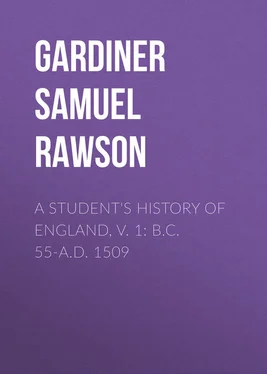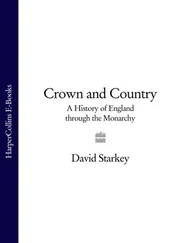Samuel Gardiner - A Student's History of England, v. 1 - B.C. 55-A.D. 1509
Здесь есть возможность читать онлайн «Samuel Gardiner - A Student's History of England, v. 1 - B.C. 55-A.D. 1509» — ознакомительный отрывок электронной книги совершенно бесплатно, а после прочтения отрывка купить полную версию. В некоторых случаях можно слушать аудио, скачать через торрент в формате fb2 и присутствует краткое содержание. Издательство: Иностранный паблик, Жанр: foreign_prose, История, foreign_antique, на английском языке. Описание произведения, (предисловие) а так же отзывы посетителей доступны на портале библиотеки ЛибКат.
- Название:A Student's History of England, v. 1: B.C. 55-A.D. 1509
- Автор:
- Издательство:Иностранный паблик
- Жанр:
- Год:неизвестен
- ISBN:нет данных
- Рейтинг книги:5 / 5. Голосов: 1
-
Избранное:Добавить в избранное
- Отзывы:
-
Ваша оценка:
- 100
- 1
- 2
- 3
- 4
- 5
A Student's History of England, v. 1: B.C. 55-A.D. 1509: краткое содержание, описание и аннотация
Предлагаем к чтению аннотацию, описание, краткое содержание или предисловие (зависит от того, что написал сам автор книги «A Student's History of England, v. 1: B.C. 55-A.D. 1509»). Если вы не нашли необходимую информацию о книге — напишите в комментариях, мы постараемся отыскать её.
A Student's History of England, v. 1: B.C. 55-A.D. 1509 — читать онлайн ознакомительный отрывок
Ниже представлен текст книги, разбитый по страницам. Система сохранения места последней прочитанной страницы, позволяет с удобством читать онлайн бесплатно книгу «A Student's History of England, v. 1: B.C. 55-A.D. 1509», без необходимости каждый раз заново искать на чём Вы остановились. Поставьте закладку, и сможете в любой момент перейти на страницу, на которой закончили чтение.
Интервал:
Закладка:
8. The Cultivators of the Soil.—When the new-comers planted themselves on British soil, each group of families united by kinship fixed its home in a separate village or township, to which was given the name of the kindred followed by 'ham' or 'tun,' the first word meaning the home or dwelling, the second the earthen mound which formed the defence of the community. Thus Wokingham is the home of the Wokings, and Wellington the 'tun' of the Wellings. Each man had a homestead of his own, with a strip or strips of arable land in an open field. Beyond the arable land was pasture and wood, common to the whole township, every villager being entitled to drive his cattle or pigs into them according to rules laid down by the whole township.
9. Eorls, Ceorls, Gesiths.—The population was divided into Eorls and Ceorls. The Eorl was hereditarily distinguished by birth, and the Ceorl was a simple freeman without any such distinction. How the difference arose we do not know, but we do know that the Eorl had privileges which the Ceorl had not. Below the Ceorls were slaves taken in war or condemned to slavery as criminals. There were also men known as Gesiths, a word which means 'followers,' who were the followers of the chiefs or Ealdormen ( Eldermen ) who led the conquerors. The Gesiths formed the war-band of the chief. They were probably all of them Eorls, so that though every settler was either an Eorl or a Ceorl, some Eorls were also Gesiths. This war-band of Gesiths was composed of young men who attached themselves to the chief by a tie of personal devotion. It was the highest glory of the Gesith to die to save his chief's life. Of one Gesith it is told that, when he saw a murderer aiming a dagger at his chief, he, not having time to seize the assassin, threw his body between the blow and his chief, and perished rather than allow him to be killed. It was even held to be disgraceful for a Gesith to return from battle alive if his chief had been slain. The word by which the chief was known was Hlaford ( Lord ), which means a giver of bread, because the Gesiths ate his bread. They not only ate his bread, but they shared in the booty which he brought home. They slept in his hall, and were clothed in the garments woven by his wife and her maidens. A continental writer tells how a body of Gesiths once approached their lord with a petition that he should take a wife, because as long as he remained unmarried there was no one to make new clothes for them or to mend their old ones.
10. The Gesiths and the Villagers.—At the time of the English settlement, therefore, there were two sorts of warriors amongst the invaders. The Ceorls, having been accustomed to till land at home, were quite ready to till the lands which they had newly acquired in Britain. They were, however, ready to defend themselves and their lands if they were attacked, and they were under the obligation of appearing in arms when needed for defence. This general army of the villagers was called the Fyrd. On the other hand, the Gesiths had not been accustomed to till land at home, but had made fighting their business. War, in short, which was an unwelcome accident to the Ceorl, was the business of life to the Gesith. The exact relationship between the Gesiths and the Ceorls cannot be ascertained with certainty. It is not improbable that the Gesiths, being the best warriors amongst their countrymen, sometimes obtained land granted them by their chiefs, and were expected in consequence to be specially ready to serve the chief whom they had followed from their home. It was from their relation to their chief that they were called Gesiths, a name gradually abandoned for that of Thegns, or servants, when they—as was soon the case—ceased to live with their chief and had houses and lands of their own, though they were still bound to military service. How these Thegns cultivated their lands is a question to which there is no certain answer. In later days they made use of a class of men known as bondmen or villeins. These bondmen were not, like slaves, the property of their masters. They had land of their own which they were allowed to cultivate for themselves on condition of spending part of their time in cultivating the land of their lords. It has been supposed by some writers that the Thegns employed bondmen from the earliest times of the conquest. If, however, this was the case, there arises a further question whether the bondmen were Englishmen or Britons. The whole subject is under investigation, and the evidence which exists is excessively scanty. It is at least certain that the further the conquest progressed westwards, the greater was the number of Britons preserved alive.
11. English and Welsh.—The bulk of the population on the eastern and southern coasts was undoubtedly English. English institutions and English language took firm root. The conquerors looked on the Britons with the utmost contempt, naming them Welsh, a name which no Briton thought of giving to himself, but which Germans had been in the habit of applying somewhat contemptuously to the Celts on the Continent. So far as British words have entered into the English language at all, they have been words such as gown or curd , which are likely to have been used by women, or words such as cart or pony , which are likely to have been used by agricultural labourers, and the evidence of language may therefore be adduced in favour of the view that many women and many agricultural labourers were spared by the conquerors.
12. The Township and the Hundred.—The smallest political community of the new settlers was the village, or, as it is commonly called, the township, which is still represented by the parish, the parish being merely a township in which ecclesiastical institutions have been maintained whilst political institutions have ceased to exist. The freemen of the township met to settle small questions between themselves, under the presidency of their reeve or headman. More important cases were brought before the hundred-moot, or meeting of the hundred, a district which had been inhabited, or was supposed to have been inhabited, either by a hundred kindred groups of the original settlers or by the families of a hundred warriors. This hundred-moot was held once a month, and was attended by four men and the reeve from every township, and also by the Eorls and Thegns living in the hundred. It not only settled disputes about property, but gave judgment in criminal cases as well.
13. Weregild.—In early days, long before the English had left their lands beyond the sea, it was not considered to be the business of the community to punish crime. If any one was murdered, it was the duty of the kinsmen of the slain man to put to death the murderer. In course of time men got tired of the continual slaughter produced by this arrangement, and there sprang up a system according to which the murderer might offer to the kinsmen a sum of money known as weregild, or the value of a man, and if this money was accepted, then peace was made and all thought of vengeance was at an end. At a later time, at all events after the arrival of the English in this country, charges of murder were brought before the hundred-moot whenever the alleged murderer and his victim lived in the same hundred. If the accused person did not dispute the fact the moot sentenced him to pay a weregild, the amount of which differed in proportion to the rank of the slain man, not in proportion to the heinousness of the offence. As there was a weregild for murder, so there was also a graduated scale of payments for lesser offences. One who struck off a hand or a foot could buy off vengeance at a fixed rate.
14. Compurgation and Ordeal.—A new difficulty was introduced when a person who was charged with crime denied his guilt. As there were no trained lawyers and there was no knowledge of the principles of evidence, the accused person was required to bring twelve men to be his compurgators—that is to say, to hear him swear to his own innocence, and then to swear in turn that his oath was true. If he could not find men willing to be his compurgators he could appeal to the judgment of the gods, which was known as the Ordeal. If he could walk blindfold over red-hot ploughshares, or plunge his arm into boiling water, and show at the end of a fixed number of days that he had received no harm, it was thought that the gods bore witness to his innocency and had as it were become his compurgators when men had failed him. It is quite possible that all or most of those who tried the ordeal failed, but as nobody would try the ordeal who could get compurgators, those who did not succeed must have been regarded as persons of bad character, so that no surprise would be expressed at their failure.
Читать дальшеИнтервал:
Закладка:
Похожие книги на «A Student's History of England, v. 1: B.C. 55-A.D. 1509»
Представляем Вашему вниманию похожие книги на «A Student's History of England, v. 1: B.C. 55-A.D. 1509» списком для выбора. Мы отобрали схожую по названию и смыслу литературу в надежде предоставить читателям больше вариантов отыскать новые, интересные, ещё непрочитанные произведения.
Обсуждение, отзывы о книге «A Student's History of England, v. 1: B.C. 55-A.D. 1509» и просто собственные мнения читателей. Оставьте ваши комментарии, напишите, что Вы думаете о произведении, его смысле или главных героях. Укажите что конкретно понравилось, а что нет, и почему Вы так считаете.












